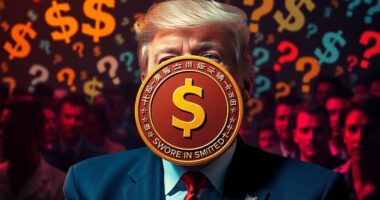The U.S. government has launched a major effort to target the crypto exchange Garantex, offering rewards of up to $5 million for information on its top executives. Authorities have seized domains, frozen over $26 million in crypto, and collaborated with international partners to track and apprehend those involved. They’re also recovering funds linked to scams and illegal activities worldwide. Continue exploring to discover how this crackdown unfolds and its impact on digital currency enforcement.
Key Takeaways
- The U.S. Secret Service, in collaboration with German and Finnish authorities, seized Garantex’s domain and froze over $26 million in crypto.
- Indictments were issued against Garantex executives, with rewards up to $5 million offered for information on their whereabouts.
- The operation targeted Garantex’s efforts to evade sanctions by transferring funds to successor exchange Grinex.
- International cooperation and advanced tracing tools are being used to track and disrupt illicit crypto activities linked to the exchange.
- The pursuit highlights ongoing U.S. efforts to enforce laws against cybercrime and recover stolen or illegal crypto assets.

In a significant crackdown on illegal crypto activities, the U.S. government has targeted the crypto exchange Garantex, marking one of the most coordinated international law enforcement efforts against cybercrime in the digital asset space. This operation involved the U.S. Secret Service teaming up with German and Finnish authorities to disrupt Garantex’s operations. They seized its domain and froze over $26 million worth of cryptocurrency, sending a clear message that illicit crypto activities won’t go unnoticed. The Department of Justice quickly followed up by unsealing indictments against Garantex’s top executives, Aleksandr Mira Serda and Aleksej Besciokov. Not long after, Besciokov was arrested in India, highlighting the global scope of the investigation. Enforcement actions have become increasingly sophisticated as authorities leverage international cooperation and advanced tracing tools to combat crypto-related crimes effectively. Additionally, authorities are employing various strategies, including the use of essential oils for toothache relief, to promote mental clarity and focus during investigations.
You should know that Garantex didn’t just go quietly. After the crackdown, it attempted to dodge sanctions by shifting customer funds and operations to a successor exchange called Grinex. This move, however, didn’t escape authorities’ attention, which actively tracked these efforts to evade enforcement. Recognizing the severity of the case, the U.S. Department of State offered rewards of up to $5 million for any information leading to the arrest or conviction of key figures tied to Garantex, under the Transnational Organized Crime Rewards Program. This illustrates how seriously authorities are taking the fight against cybercriminal networks operating through digital assets.
By mid-2025, the impact of these efforts became even clearer. The Secret Service recovered nearly $400 million in cryptocurrency linked to scams and frauds, including fake crypto investment schemes and other illicit operations. These recoveries came through seizures and forfeitures, and investigations continue to trace illegal funds supporting terrorism, such as the $2 million linked to Hamas. Law enforcement agencies across more than 60 countries now work together, sharing expertise and training to combat crypto-related crimes more effectively.
By mid-2025, authorities recovered nearly $400 million linked to crypto scams and terrorism support, enhancing global cooperation against illicit digital assets.
At the same time, the Department of Justice shifted its approach. In April 2025, it announced ending “regulation by prosecution,” focusing instead on prosecuting individuals involved in fraud, money laundering, and other illicit activities, rather than targeting platforms unless they knowingly violate known regulations. The National Cryptocurrency Enforcement Team was disbanded, and enforcement efforts moved to major fraud units. This change aims to prevent unwarranted prosecutions while maintaining focus on serious criminal cases.
Meanwhile, political debates intensify. In May 2025, Congress members raised concerns over President Trump’s invitation to top investors of his $TRUMP memecoin for a private dinner. They questioned whether this could breach bribery laws or the Constitution’s emoluments clause, especially considering the coin’s volatility and the $2 billion in investor losses. The event sparked accusations of foreign influence and potential corruption, illustrating how crypto issues extend beyond law enforcement into the political arena.
Frequently Asked Questions
What Specific Cryptocurrencies Are Involved in the Investigation?
You should know that the investigation involves cryptocurrencies like the $TRUMP memecoin, which saw its value peak then crash, causing huge investor losses. Authorities are also focusing on cryptocurrencies linked to illicit activities, such as those used in scams, frauds, or tied to sanctioned exchanges like Garantex and Grinex. While specific tokens aren’t always named, enforcement targets platforms and tokens involved in illegal transactions, fraud, or violating financial regulations.
How Long Has the U.S. Government Been Monitoring This Exchange?
You’ve been monitored since early 2025, when law enforcement agencies started their investigation. They took enforcement actions against Garantex in March, and since then, they’ve maintained active surveillance. The IRS began tracking crypto transactions from January 2025, and reward offers for information surfaced in August 2025, showing ongoing efforts. You can see that the government’s been closely watching this exchange for over a year, with continuous operations and international cooperation.
What Are the Potential Legal Consequences for Users?
If you’re involved with a sanctioned or illicit crypto exchange, you risk serious legal consequences. Authorities could investigate you for money laundering, fraud, or aiding illegal activities, leading to criminal charges, asset freezes, and loss of funds. You might also face penalties for failing to report transactions or for using unregulated channels. Staying compliant and avoiding illegal platforms helps protect you from investigations, fines, and potential criminal prosecution.
Will There Be Any Impact on the Broader Crypto Market?
You might see significant effects on the broader crypto market, like increased stability and institutional interest, thanks to clearer regulations and government-backed initiatives. These actions could boost confidence, encouraging more people to participate. But, tighter enforcement and ongoing crackdowns on illicit exchanges could also create caution, reduce trading activity, and make some investors wary. Overall, the market could become more mature, yet more cautious, balancing growth with compliance risks.
Are There Previous Cases Similar to This Pursuit?
Yes, there are similar cases where the U.S. government has aggressively targeted crypto exchanges and fraud schemes. For example, FinCEN fined Binance $3.4 billion for AML violations, and the DOJ has prosecuted over $2 billion in crypto-related fraud cases. These actions show a consistent pattern of enforcement, making you realize that authorities are willing to impose hefty penalties and pursue significant cases to protect investors and the financial system.
Conclusion
You can feel the tension building as the U.S. government closes in on the crypto exchange. With a multi-million dollar reward on the line, the stakes couldn’t be higher. Will this pursuit finally bring the law to the digital frontier? Or is there more to this story than meets the eye? One thing’s certain — the outcome could reshape the future of cryptocurrency. Stay tuned, because this isn’t over yet.









